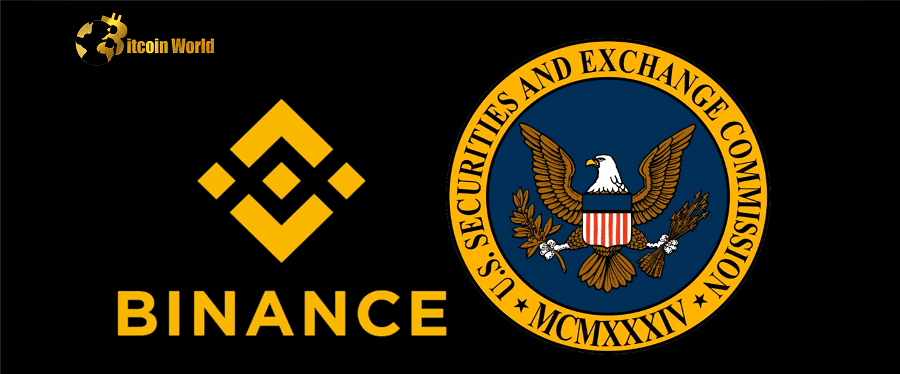Hold onto your hats, crypto enthusiasts! Just when you thought the dust was settling in the crypto winter, a major development has shaken the industry. Imagine a billion-dollar deal hitting a brick wall – that’s exactly what happened when New York and federal finance regulators stepped in to block Binance.US’s ambitious plan to acquire the assets of bankrupt crypto lender Voyager Digital. Let’s dive into the details of this blockbuster block and understand why regulators are pumping the brakes on this acquisition.
Why Did Regulators Slam the Brakes on the Binance.US-Voyager Deal?
The move, revealed in documents on February 22nd, isn’t just a minor speed bump; it’s a full-on roadblock. Regulators are citing serious concerns, labeling the transaction as potentially ‘discriminatory and illegal.’ But what exactly fueled this regulatory intervention? Here’s a breakdown of the key reasons:
- SEC Scrutiny and Unregistered Securities: The Securities and Exchange Commission (SEC) is increasingly flexing its muscles in the crypto space. Fresh off the heels of its action against Kraken’s staking services, the SEC is now raising alarms about potential unregistered security sales related to the Voyager deal. Specifically, the SEC is pointing fingers at Voyager’s own VGX token.
- Violation of Securities Act of 1933: The core issue, according to the SEC, lies in how Voyager plans to repay its former clients. The SEC argues that the process of rebalancing and redistributing crypto assets, especially involving the VGX token, might violate Section 5 of the Securities Act of 1933. This act is all about preventing the unregistered offer, sale, or delivery of securities.
- Concerns About Binance’s Past Conduct: Adding fuel to the fire, regulators are pointing to media reports suggesting Binance is bracing itself to pay hefty fines for past missteps related to money laundering and corruption laws. This baggage makes regulators wary about the feasibility and legitimacy of the acquisition.
- New York State’s Stance: Illegal Operations and Consumer Protection: The New York State Department of Financial Services (NYDFS) and Attorney General Letitia James aren’t mincing words. They’ve filed documents alleging that Voyager was operating illegally in New York, serving consumers without the necessary licenses. NYDFS emphasizes that this unlicensed operation deprived New Yorkers of crucial consumer protections.
- Discrimination Against New York Customers: NYDFS further claims the deal is discriminatory against New Yorkers. Why? Because under the current plan, New York residents might be stuck waiting for up to six months to access their cryptocurrency while Binance.US navigates state clearance.
- Uncertainty Around Binance.US’s Financial Capacity: Even back in January, the SEC voiced concerns about a lack of clarity regarding Binance.US’s financial resources to actually pull off this billion-dollar acquisition.
The SEC stated firmly, “it is the Debtors’ burden to show convincing evidence that the provisions of the Plan are practical and do not contravene existing law.” This puts significant pressure on Voyager and Binance.US to address these serious regulatory hurdles.
Voyager’s Defense: Is This Hypocrisy or a Fair Deal?
Voyager isn’t backing down without a fight. They’ve consistently argued that the Binance.US deal is the best path forward for their creditors, offering the most favorable outcome in a difficult situation. Furthermore, Voyager’s legal team has labeled the NYDFS complaints as “hypocritical.” Their argument? That these very authorities are simultaneously restricting the crypto industry, making it harder for companies like Voyager to operate and, by extension, limiting options for creditors.
Adding to the complexity, Voyager highlighted that creditors were voting on the deal, with a deadline set for Wednesday at 16:00 Eastern Time. According to Voyager’s legal counsel, with just hours left, a significant majority of creditors had already cast their votes, presumably in favor of the Binance.US acquisition.
What Does This Block Mean for the Crypto World?
This regulatory intervention sends a powerful message across the cryptocurrency landscape. It underscores the increasing scrutiny and assertive stance of US regulators, particularly the SEC and state financial watchdogs like NYDFS.
Key Takeaways:
- Regulation is Here to Stay: If there was any doubt, this incident reinforces that crypto is firmly in the sights of regulators. Expect continued and potentially stricter oversight.
- Compliance is Non-Negotiable: Operating without proper licenses and adhering to securities laws is becoming increasingly risky. Crypto businesses need to prioritize compliance.
- Consumer Protection is Paramount: Regulators are clearly focused on protecting consumers. Practices that are perceived as discriminatory or risky for consumers will face strong opposition.
- Past Conduct Matters: A company’s regulatory history can significantly impact its ability to conduct business and pursue acquisitions in the crypto space.
What Happens Next?
The future of the Binance.US-Voyager deal hangs in the balance. Here are a few potential scenarios:
| Scenario | Likelihood | Impact |
|---|---|---|
| Binance.US and Voyager address regulatory concerns, deal proceeds (with modifications). | Moderate | Positive for Voyager creditors, sets a precedent for navigating regulatory hurdles. |
| Deal collapses entirely. Voyager seeks alternative solutions. | Moderate | Negative for Voyager creditors, prolongs uncertainty, raises questions about Binance.US’s US strategy. |
| Regulatory scrutiny intensifies, further chilling crypto acquisitions and expansion in the US. | Possible | Wider negative impact on crypto industry growth in the US, potential shift of focus to more regulatory-friendly jurisdictions. |
The coming weeks will be crucial in determining the fate of this billion-dollar deal and its broader implications for the crypto industry. Stay tuned as we continue to track this developing story!
Disclaimer: The information provided is not trading advice, Bitcoinworld.co.in holds no liability for any investments made based on the information provided on this page. We strongly recommend independent research and/or consultation with a qualified professional before making any investment decisions.


